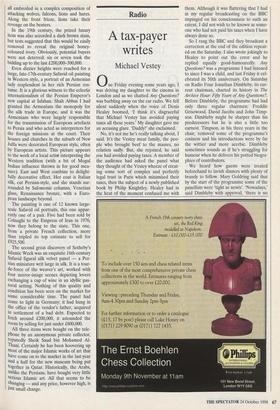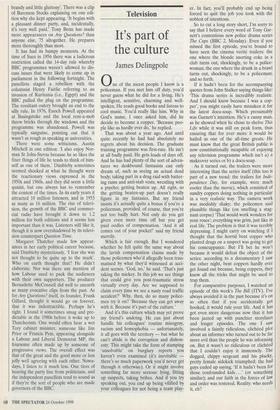Radio
A tax-payer
writes
Michael Vestey
One Friday evening some years ago, I was driving my daughter to the cinema in London and as we chatted Any Questions? was burbling away on the car radio. We fell silent suddenly when the voice of Denis Healey boomed, 'I think it's disgraceful that Michael Vestey has avoided paying taxes all these years.' My daughter gave me an accusing glare. 'Daddy!' she exclaimed.
No, it's not me he's really talking about, I said. It's the Vestey meat family, the peo- ple who brought beef to the masses, no relation sadly. But, she rejoined, he said you had avoided paying taxes. A member of the audience had asked the panel what they thought of the Vestey wheeze of creat- ing some sort of complex and perfectly legal trust in Paris which minimised their taxes, then the subject of a newly published book by Philip Knightley. Healey had in the heat of the moment confused me with them. Although it was flattering that I had in my regular broadcasting on the BBC impinged on his consciousness to such an extent, I did not wish to be known as some- one who had not paid his taxes when I have always done so.
So I rang the BBC and they broadcast a correction at the end of the edition repeat- ed on the Saturday. I also wrote jokingly to Healey to point out the error and he replied equally good-humouredly. Any Questions? was a programme I had listened to since I was a child, and last Friday it cel- ebrated its 50th anniversary. On Saturday on Radio Four Jonathan Dimbleby, its cur- rent chairman, charted its history in The Archive Hour: Fifty Years of Any Questions?. Before Dimbleby, the programme had had only three regular chairmen: Freddie Grisewood, David Jacobs and John Timp- son. Dimbleby might be sharper than his predecessors but he is also a little too earnest. Timpson, in his three years in the chair, removed some of the programme's cosiness and his introductions were by far the wittier and more acerbic. Dimbleby sometimes sounds as if he's struggling for humour when he delivers his potted biogra- phies of contributors.
We heard how guests were treated beforehand to lavish dinners with plenty of brandy to follow. Mary Goldring said that by the start of the programme some of the panellists were 'tight as newts'. 'Nowadays,' said Dimbleby with approval, 'there is no brandy and little gluttony'. There was a clip of Baroness Stocks explaining on one edi- tion why she kept appearing. 'It begins with a pleasant dinner party, and, incidentally, it's very well paid.' Tony Benn has made more appearances on Any Questions? than anyone else, 75 altogether. He prepares more thoroughly than most.
It has had its bumpy moments. At the time of Suez in 1956 there was a ludicrous restriction called the 14-day rule whereby BBC programmes weren't allowed to dis- cuss issues that were likely to come up in parliament in the following fortnight. The panellists staged a rebellion with the columnist Henry Fairlie referring to an invasion of Ruritania (i.e., Egypt) and the BBC pulled the plug on the programme. The resultant outcry brought an end to the silly rule. In 1976, Enoch Powell appeared at Basingstoke and the local rent-a-mob threw bricks through the windows and the programme was abandoned. Powell was typically sanguine, pointing out that it wasn't as rough as speaking at universities.
There were some witticisms. Austin Mitchell in one edition: 'I also enjoy Nor- man St John-Stevas because he so likes the finer things of life he tends to think of him- self as one of them.' Dimbleby sometimes seemed shocked at what he thought were the reactionary views expressed in the 1950s and 1960s, and they did seem a little quaint, but one always has to remember the context of the times. In its early years it attracted 10 million listeners, and in 1953 as many as 16 million. The rise of televi- sion, the growth of the BBC and commer- cial radio have brought it down to 1.2 million for both editions and it seems less important than it was. Listeners still like it, though it is now overshadowed by its televi- sion counterpart Question Time.
Margaret Thatcher made few appear- ances in her early political career because, said Dimbleby mysteriously, 'I fear she was not thought to be quite up to the mark'. Who on earth thought that? He didn't elaborate. Nor was there any mention of how Labour used to pack the audiences with their own supporters. The producer Bernadette McConnell did well to unearth so many evocative clips from the past. As for Any Questions? itself, its founder, Frank Gillard, thought it would go on forever, that it was indestructible. Perhaps he's right. I found it sometimes smug and pre- dictable in the 1980s before it woke up to Thatcherism. One would often hear a wet Tory cabinet minister, someone like Jim Prior or Francis Pym, appearing alongside a Labour and Liberal Democrat MP, the foursome often made up by someone of progressive views. The overall effect was that of the great and the good more or less jolly well agreeing with each other. Nowa- days, I listen to it much less. One tires of hearing the party line from politicians, and the independent panellists tend to sound as if they're the sort of people who are made governors of the BBC.



















































































 Previous page
Previous page